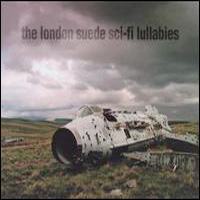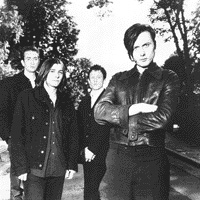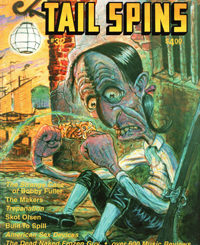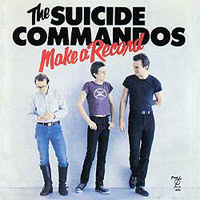 The London Suede
The London Suede
Sci-Fi Lullabies (Columbia)
by Nik Rainey
Pity (the) poor (London) Suede. Born into one of the regularly-scheduled Brit-unfriendly periods in popular song, when the flavor du jour smacked of macho self-hatred and inner-child beating, their moment of impact – fueled by lickerish lashings of gender-pref ambiguity, coy wit, and artful pop melodies handed down from Bowie and Morrissey – was, despite being carefully engineered and choreographed by their record company and the fickle trou-moistenings of the English press, heard by many but acknowledged by few. And since they made the most deadly of tactical errors for a British band (a) they stuck around, b) they refused to get into brawls or feuds with other bands, c) they fought all of their inter-band battles away from journalists’ tape-recorders), they’ve found themselves in the six years since their debut in cultophilic limbo with a curiously non-ostentatious public image and a really awkward name change for Yank consumption (what, did the fabric sue?). What few have seemed to notice, therefore, is that, in spite of blows that have turned other bands to dust (namely, the departure of their main guitarist/tunesmith, Bernard Butler), T.L. Suede have continued to get even better, neither gumming up the works with slavish Beatle-bumming or looking to the collected Matador catalogue for inspiration-grafts like other bands I could name. If the masterful glitter-pop of last year’s Coming Up wasn’t enough to prove it, just viddy Sci-Fi Lullabies: Two CDs, 27 crystalline pieces of pop grandiosity without a single duffer in the lot, and here’s the kicker: These are just the b-sides.
 That’s right, kiddywinkies: these are the extra tracks Suede included on their European singles from 1992-97, all of which are every bit the equal of those found on the albums proper, so effortless in their lush (but not fey) melancholia and guitar-laden sweep that it puts the vast majority of pop-schlocksters to utter, hang-the-thing-that-supports-your-hairstyle shame. The consistency is breathtaking – when you know your subject, you can render endless variations on it as easy as batting your lanky lashes, and Brett Anderson, with his breathy vocal repertoire and unerring knack for painting beautifully vulgar lyrical pictures (imagine Look Back in Anger as directed by Julien Temple), captures what it is to be young, pretty, and photogenically dissolute in the rainy cityscape without dropping into the mawkish puddles of Mozzer’s most self-parodic pastiches. And the band, both lineups of it, matches him plaint for plaint, swiping moves from the Marc Bolan and Mick Ronson omnibooks with nary a pompous misstep in sight. When, near the end of the album, Anderson pulls off one of the lazy songwriter’s tritest tricks – paying homage to his record collection by reeling off song titles – in “These Are The Sad Songs” (the only song in memory that places Don McClean and the Fall side-by-side), it plays less desperate than necessary, and even manages to add itself to the pantheon. Just one of the brilliant sleights-of-hand to the credit of a band that deserves the respect that has too long eluded them. Get this, get this, get this.
That’s right, kiddywinkies: these are the extra tracks Suede included on their European singles from 1992-97, all of which are every bit the equal of those found on the albums proper, so effortless in their lush (but not fey) melancholia and guitar-laden sweep that it puts the vast majority of pop-schlocksters to utter, hang-the-thing-that-supports-your-hairstyle shame. The consistency is breathtaking – when you know your subject, you can render endless variations on it as easy as batting your lanky lashes, and Brett Anderson, with his breathy vocal repertoire and unerring knack for painting beautifully vulgar lyrical pictures (imagine Look Back in Anger as directed by Julien Temple), captures what it is to be young, pretty, and photogenically dissolute in the rainy cityscape without dropping into the mawkish puddles of Mozzer’s most self-parodic pastiches. And the band, both lineups of it, matches him plaint for plaint, swiping moves from the Marc Bolan and Mick Ronson omnibooks with nary a pompous misstep in sight. When, near the end of the album, Anderson pulls off one of the lazy songwriter’s tritest tricks – paying homage to his record collection by reeling off song titles – in “These Are The Sad Songs” (the only song in memory that places Don McClean and the Fall side-by-side), it plays less desperate than necessary, and even manages to add itself to the pantheon. Just one of the brilliant sleights-of-hand to the credit of a band that deserves the respect that has too long eluded them. Get this, get this, get this.



